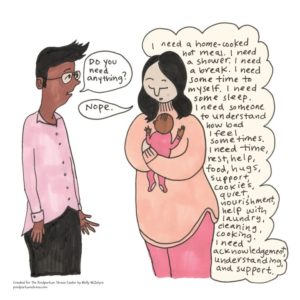
I have always loved the word wellbeing. When I think of feeling well, being content in the moment I’m living in, having what I need to make it the rest of the day, this is the word that comes to mind. The concept of a counseling agency called Bienestar (wellbeing) was born from my experience living out this word. The Merriam-Webster dictionary defines wellbeing as the state of being happy, healthy, or prosperous. The definition in Spanish is a little different: State of the person whose physical and mental conditions provide a feeling of satisfaction and tranquility.
Notice that neither definition specifies that such a state can only be achieved when things are going well for us either physically, mentally, emotionally, or economically. I appreciate the fact that my wellbeing is not dictated by my current circumstances, but instead, it’s dependent of my state of mind.
There is a Bible verse that uses the word wellbeing (in some cases translating the word into prosperity) and we can find it in the book of Jeremiah chapter 29, verse 11. For I know the plans that I have for you,’ declares the LORD, ‘plans for well-being, and not for calamity, in order to give you a future and a hope.
The Prophet Jeremiah has been nicknamed the weeping prophet, because well, he wept… a lot. In a nut shell, the book of Jeremiah is a book that chronicles a whole nation hitting rock bottom and he is the man who was appointed by God to send a message of repentance. For forty years he preached of a coming catastrophe brought on by people’s bad choices, and for forty years he was ignored, rejected, laughed at, scorned, rebuked, and mocked, not to mention the times his very life was endangered. In then end, the very things he predicted came to be and his people were enslaved, many were killed, and the city of Jerusalem, with its beautiful temple, destroyed. Jeremiah had every right to weep and lament (which he did in the book of Lamentations), but also every right to turn out a bitter, depressed, and an overall dysfunctional, hopeless individual. But that’s not the case. Instead of despair, he decided to hope and be a positive voice and encourager to the people exiled and held in captivity. Jeremiah 29 records a letter he sent to the people that were exiled and held captive, a letter in which he shares a promise the Lord made: That their captivity would end and that God had plans, good plans for them; plans for their well-being, not for evil, so they might have a future and a hope. The original Hebrew word that has been translated prosperity and wellbeing in some versions of the Bible is shalowm, and it means peace. And isn’t that what it all comes down to? That we can all find a measure of peace in the midst any circumstance? Peace is at the root of wellbeing, happiness, and prosperity. God inspired Jeremiah to send a message to a beaten down and broken people that His plans would bring them peace and that they could look towards the future with a sense of hope.
I am a Christian, and although I have been professionally trained as a counselor, I can not negate the fact that true healing, a true sense of wellbeing, a true sense of peace can not be experienced without opening the door for God to work in our lives. Through the work of Jesus Christ, God has given all of us an opportunity to experience this peace in the midst of any circumstance. Jesus said: Peace I leave with you; my peace I give you. I do not give to you as the world gives. Do not let your hearts be troubled and do not be afraid. (John14:27)
And also that the peace of God, which transcends all understanding, will guard your hearts and your minds in Christ Jesus. (Philippians 4:7).
As a professional counselor, I understand that the link between feelings, thoughts, and behaviors is a key factor in our journey to healing. This is the reason I employ cognitive behavioral interventions in my practice. I have personally gone through valleys of shadows, sorrow, and pain. I don’t doubt that the future might hold some other difficult circumstances, but I look towards the future with a sense of hope because I have experienced the peace of God. As you work through your particular circumstance, alone or with the help of a professional, I pray you don’t discard the help of the One who is able to give you that peace that will help you look towards the future with hope. May this new understanding of the word wellbeing inspire you to have a different outlook as your continue your life journey and shed some light into why I picked this as the name of my practice.
Blessings,
Sarah
P.S. I look forward to sharing some weekly insights in my blog: Bienestar: Conversations that Edify, in which I will be sharing with you tips and encouragement during your journey to wellbeing. Topics will cover all aspects of integral health (physical, emotional, mental, and spiritual) and the interconnection between them. I will enjoy reading your comments as you join the discussion.



